BMS502 Reflective Journal: Management and Leadership at Tesco plc
VerifiedAdded on 2023/06/13
|9
|2548
|255
Journal and Reflective Writing
AI Summary
This journal explores management and leadership roles within Tesco plc, a leading UK supermarket chain. It examines management principles, work-related skills observed in practice, and potential improvements. The journal also explores demonstrated competencies and how professional practice could be enhanced. Furthermore, it outlines Tesco's strategic aims, analyzes the role of managers, and their contribution to the company's performance and strategic direction, highlighting the importance of effective leadership and management in achieving organizational success. This document is available on Desklib, a platform providing study tools and resources for students.

Journal BMS502
Paraphrase This Document
Need a fresh take? Get an instant paraphrase of this document with our AI Paraphraser
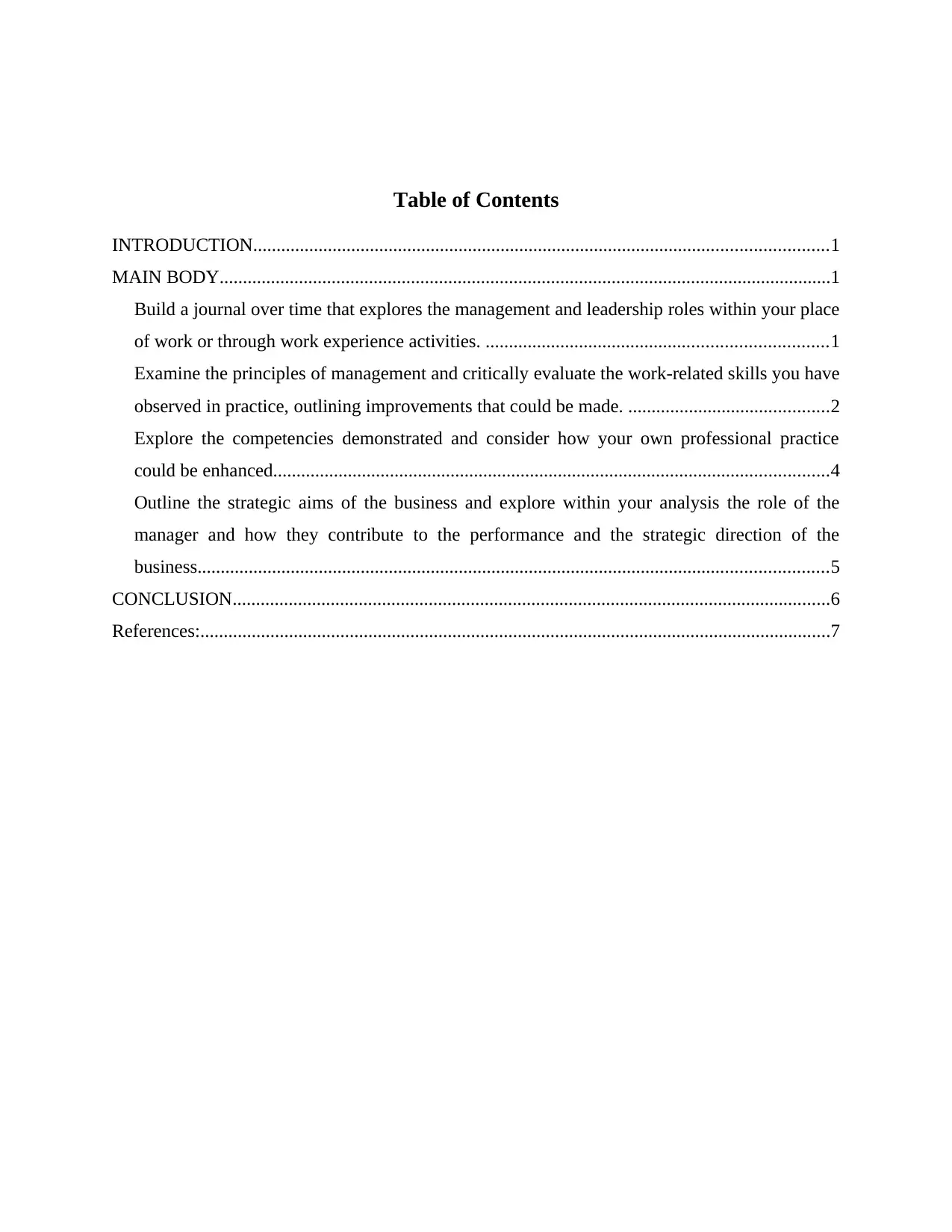
Table of Contents
INTRODUCTION...........................................................................................................................1
MAIN BODY...................................................................................................................................1
Build a journal over time that explores the management and leadership roles within your place
of work or through work experience activities. .........................................................................1
Examine the principles of management and critically evaluate the work-related skills you have
observed in practice, outlining improvements that could be made. ...........................................2
Explore the competencies demonstrated and consider how your own professional practice
could be enhanced.......................................................................................................................4
Outline the strategic aims of the business and explore within your analysis the role of the
manager and how they contribute to the performance and the strategic direction of the
business.......................................................................................................................................5
CONCLUSION................................................................................................................................6
References:.......................................................................................................................................7
INTRODUCTION...........................................................................................................................1
MAIN BODY...................................................................................................................................1
Build a journal over time that explores the management and leadership roles within your place
of work or through work experience activities. .........................................................................1
Examine the principles of management and critically evaluate the work-related skills you have
observed in practice, outlining improvements that could be made. ...........................................2
Explore the competencies demonstrated and consider how your own professional practice
could be enhanced.......................................................................................................................4
Outline the strategic aims of the business and explore within your analysis the role of the
manager and how they contribute to the performance and the strategic direction of the
business.......................................................................................................................................5
CONCLUSION................................................................................................................................6
References:.......................................................................................................................................7
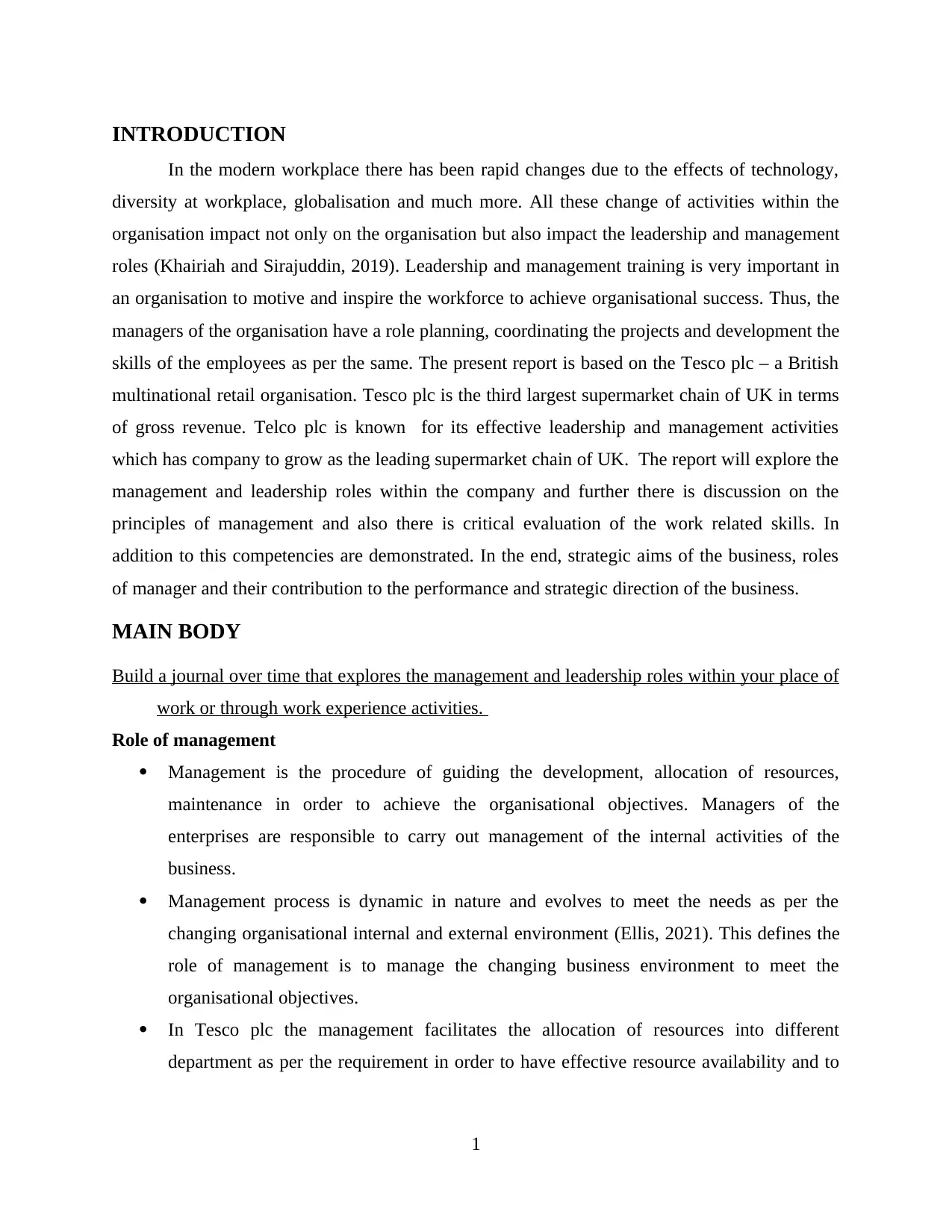
INTRODUCTION
In the modern workplace there has been rapid changes due to the effects of technology,
diversity at workplace, globalisation and much more. All these change of activities within the
organisation impact not only on the organisation but also impact the leadership and management
roles (Khairiah and Sirajuddin, 2019). Leadership and management training is very important in
an organisation to motive and inspire the workforce to achieve organisational success. Thus, the
managers of the organisation have a role planning, coordinating the projects and development the
skills of the employees as per the same. The present report is based on the Tesco plc – a British
multinational retail organisation. Tesco plc is the third largest supermarket chain of UK in terms
of gross revenue. Telco plc is known for its effective leadership and management activities
which has company to grow as the leading supermarket chain of UK. The report will explore the
management and leadership roles within the company and further there is discussion on the
principles of management and also there is critical evaluation of the work related skills. In
addition to this competencies are demonstrated. In the end, strategic aims of the business, roles
of manager and their contribution to the performance and strategic direction of the business.
MAIN BODY
Build a journal over time that explores the management and leadership roles within your place of
work or through work experience activities.
Role of management
Management is the procedure of guiding the development, allocation of resources,
maintenance in order to achieve the organisational objectives. Managers of the
enterprises are responsible to carry out management of the internal activities of the
business.
Management process is dynamic in nature and evolves to meet the needs as per the
changing organisational internal and external environment (Ellis, 2021). This defines the
role of management is to manage the changing business environment to meet the
organisational objectives.
In Tesco plc the management facilitates the allocation of resources into different
department as per the requirement in order to have effective resource availability and to
1
In the modern workplace there has been rapid changes due to the effects of technology,
diversity at workplace, globalisation and much more. All these change of activities within the
organisation impact not only on the organisation but also impact the leadership and management
roles (Khairiah and Sirajuddin, 2019). Leadership and management training is very important in
an organisation to motive and inspire the workforce to achieve organisational success. Thus, the
managers of the organisation have a role planning, coordinating the projects and development the
skills of the employees as per the same. The present report is based on the Tesco plc – a British
multinational retail organisation. Tesco plc is the third largest supermarket chain of UK in terms
of gross revenue. Telco plc is known for its effective leadership and management activities
which has company to grow as the leading supermarket chain of UK. The report will explore the
management and leadership roles within the company and further there is discussion on the
principles of management and also there is critical evaluation of the work related skills. In
addition to this competencies are demonstrated. In the end, strategic aims of the business, roles
of manager and their contribution to the performance and strategic direction of the business.
MAIN BODY
Build a journal over time that explores the management and leadership roles within your place of
work or through work experience activities.
Role of management
Management is the procedure of guiding the development, allocation of resources,
maintenance in order to achieve the organisational objectives. Managers of the
enterprises are responsible to carry out management of the internal activities of the
business.
Management process is dynamic in nature and evolves to meet the needs as per the
changing organisational internal and external environment (Ellis, 2021). This defines the
role of management is to manage the changing business environment to meet the
organisational objectives.
In Tesco plc the management facilitates the allocation of resources into different
department as per the requirement in order to have effective resource availability and to
1
⊘ This is a preview!⊘
Do you want full access?
Subscribe today to unlock all pages.

Trusted by 1+ million students worldwide
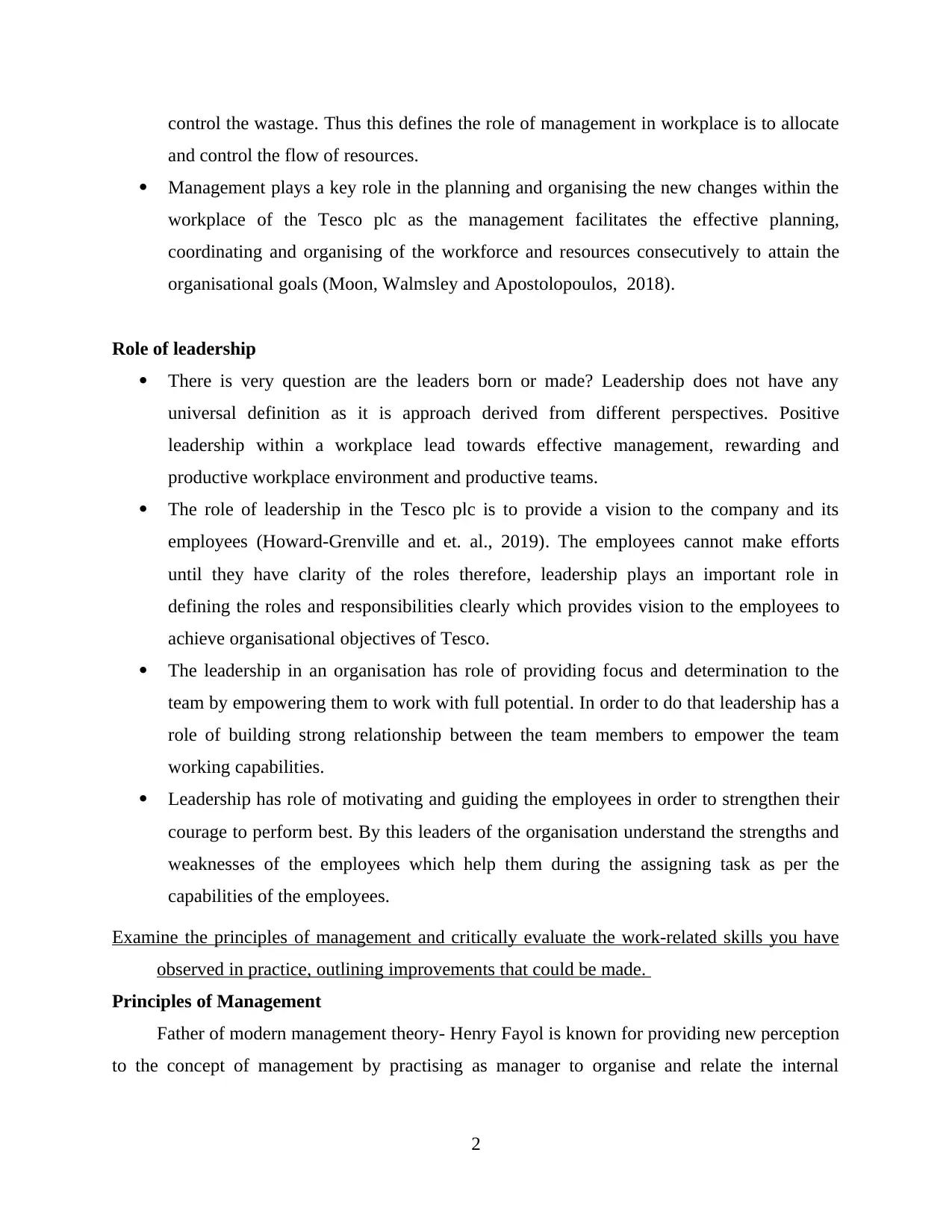
control the wastage. Thus this defines the role of management in workplace is to allocate
and control the flow of resources.
Management plays a key role in the planning and organising the new changes within the
workplace of the Tesco plc as the management facilitates the effective planning,
coordinating and organising of the workforce and resources consecutively to attain the
organisational goals (Moon, Walmsley and Apostolopoulos, 2018).
Role of leadership
There is very question are the leaders born or made? Leadership does not have any
universal definition as it is approach derived from different perspectives. Positive
leadership within a workplace lead towards effective management, rewarding and
productive workplace environment and productive teams.
The role of leadership in the Tesco plc is to provide a vision to the company and its
employees (Howard-Grenville and et. al., 2019). The employees cannot make efforts
until they have clarity of the roles therefore, leadership plays an important role in
defining the roles and responsibilities clearly which provides vision to the employees to
achieve organisational objectives of Tesco.
The leadership in an organisation has role of providing focus and determination to the
team by empowering them to work with full potential. In order to do that leadership has a
role of building strong relationship between the team members to empower the team
working capabilities.
Leadership has role of motivating and guiding the employees in order to strengthen their
courage to perform best. By this leaders of the organisation understand the strengths and
weaknesses of the employees which help them during the assigning task as per the
capabilities of the employees.
Examine the principles of management and critically evaluate the work-related skills you have
observed in practice, outlining improvements that could be made.
Principles of Management
Father of modern management theory- Henry Fayol is known for providing new perception
to the concept of management by practising as manager to organise and relate the internal
2
and control the flow of resources.
Management plays a key role in the planning and organising the new changes within the
workplace of the Tesco plc as the management facilitates the effective planning,
coordinating and organising of the workforce and resources consecutively to attain the
organisational goals (Moon, Walmsley and Apostolopoulos, 2018).
Role of leadership
There is very question are the leaders born or made? Leadership does not have any
universal definition as it is approach derived from different perspectives. Positive
leadership within a workplace lead towards effective management, rewarding and
productive workplace environment and productive teams.
The role of leadership in the Tesco plc is to provide a vision to the company and its
employees (Howard-Grenville and et. al., 2019). The employees cannot make efforts
until they have clarity of the roles therefore, leadership plays an important role in
defining the roles and responsibilities clearly which provides vision to the employees to
achieve organisational objectives of Tesco.
The leadership in an organisation has role of providing focus and determination to the
team by empowering them to work with full potential. In order to do that leadership has a
role of building strong relationship between the team members to empower the team
working capabilities.
Leadership has role of motivating and guiding the employees in order to strengthen their
courage to perform best. By this leaders of the organisation understand the strengths and
weaknesses of the employees which help them during the assigning task as per the
capabilities of the employees.
Examine the principles of management and critically evaluate the work-related skills you have
observed in practice, outlining improvements that could be made.
Principles of Management
Father of modern management theory- Henry Fayol is known for providing new perception
to the concept of management by practising as manager to organise and relate the internal
2
Paraphrase This Document
Need a fresh take? Get an instant paraphrase of this document with our AI Paraphraser
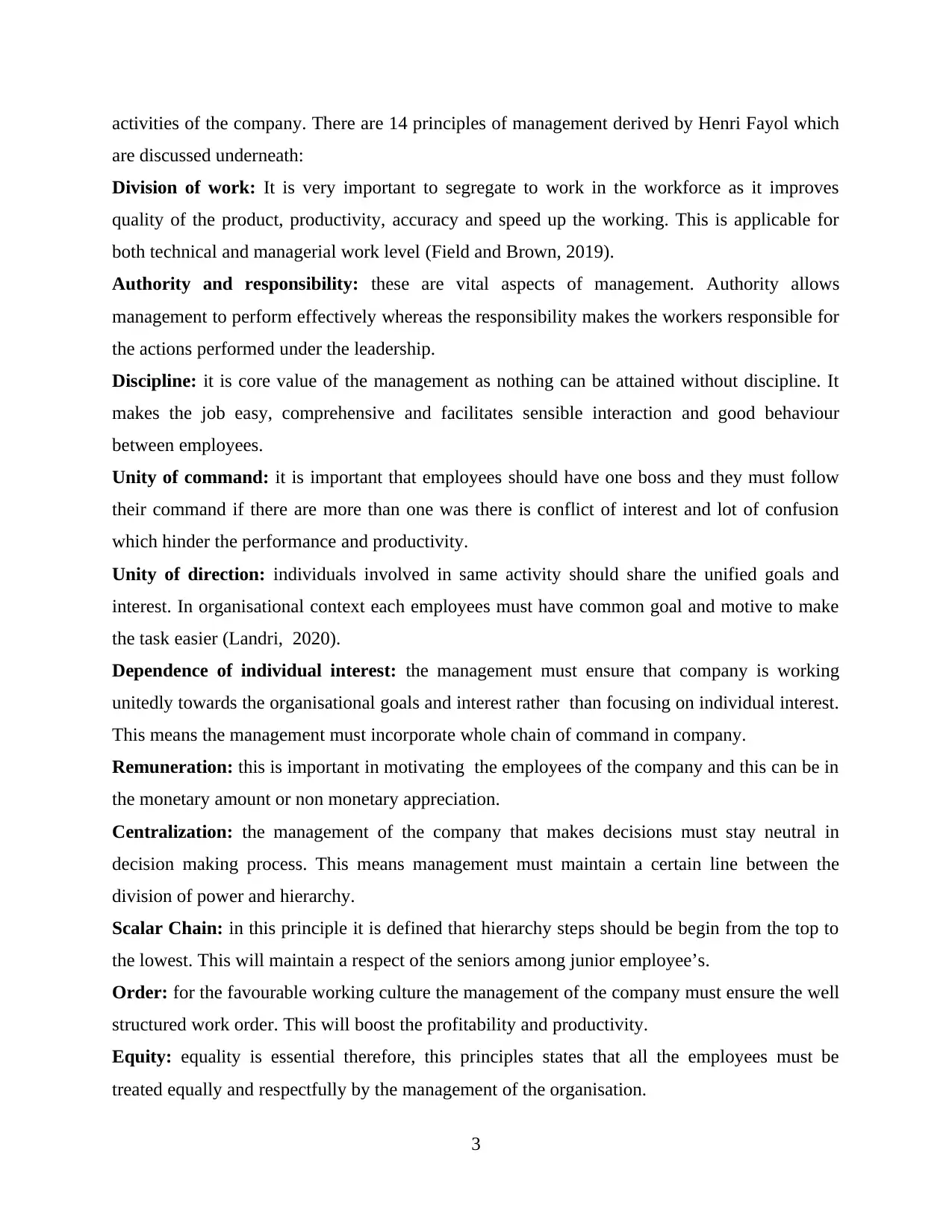
activities of the company. There are 14 principles of management derived by Henri Fayol which
are discussed underneath:
Division of work: It is very important to segregate to work in the workforce as it improves
quality of the product, productivity, accuracy and speed up the working. This is applicable for
both technical and managerial work level (Field and Brown, 2019).
Authority and responsibility: these are vital aspects of management. Authority allows
management to perform effectively whereas the responsibility makes the workers responsible for
the actions performed under the leadership.
Discipline: it is core value of the management as nothing can be attained without discipline. It
makes the job easy, comprehensive and facilitates sensible interaction and good behaviour
between employees.
Unity of command: it is important that employees should have one boss and they must follow
their command if there are more than one was there is conflict of interest and lot of confusion
which hinder the performance and productivity.
Unity of direction: individuals involved in same activity should share the unified goals and
interest. In organisational context each employees must have common goal and motive to make
the task easier (Landri, 2020).
Dependence of individual interest: the management must ensure that company is working
unitedly towards the organisational goals and interest rather than focusing on individual interest.
This means the management must incorporate whole chain of command in company.
Remuneration: this is important in motivating the employees of the company and this can be in
the monetary amount or non monetary appreciation.
Centralization: the management of the company that makes decisions must stay neutral in
decision making process. This means management must maintain a certain line between the
division of power and hierarchy.
Scalar Chain: in this principle it is defined that hierarchy steps should be begin from the top to
the lowest. This will maintain a respect of the seniors among junior employee’s.
Order: for the favourable working culture the management of the company must ensure the well
structured work order. This will boost the profitability and productivity.
Equity: equality is essential therefore, this principles states that all the employees must be
treated equally and respectfully by the management of the organisation.
3
are discussed underneath:
Division of work: It is very important to segregate to work in the workforce as it improves
quality of the product, productivity, accuracy and speed up the working. This is applicable for
both technical and managerial work level (Field and Brown, 2019).
Authority and responsibility: these are vital aspects of management. Authority allows
management to perform effectively whereas the responsibility makes the workers responsible for
the actions performed under the leadership.
Discipline: it is core value of the management as nothing can be attained without discipline. It
makes the job easy, comprehensive and facilitates sensible interaction and good behaviour
between employees.
Unity of command: it is important that employees should have one boss and they must follow
their command if there are more than one was there is conflict of interest and lot of confusion
which hinder the performance and productivity.
Unity of direction: individuals involved in same activity should share the unified goals and
interest. In organisational context each employees must have common goal and motive to make
the task easier (Landri, 2020).
Dependence of individual interest: the management must ensure that company is working
unitedly towards the organisational goals and interest rather than focusing on individual interest.
This means the management must incorporate whole chain of command in company.
Remuneration: this is important in motivating the employees of the company and this can be in
the monetary amount or non monetary appreciation.
Centralization: the management of the company that makes decisions must stay neutral in
decision making process. This means management must maintain a certain line between the
division of power and hierarchy.
Scalar Chain: in this principle it is defined that hierarchy steps should be begin from the top to
the lowest. This will maintain a respect of the seniors among junior employee’s.
Order: for the favourable working culture the management of the company must ensure the well
structured work order. This will boost the profitability and productivity.
Equity: equality is essential therefore, this principles states that all the employees must be
treated equally and respectfully by the management of the organisation.
3
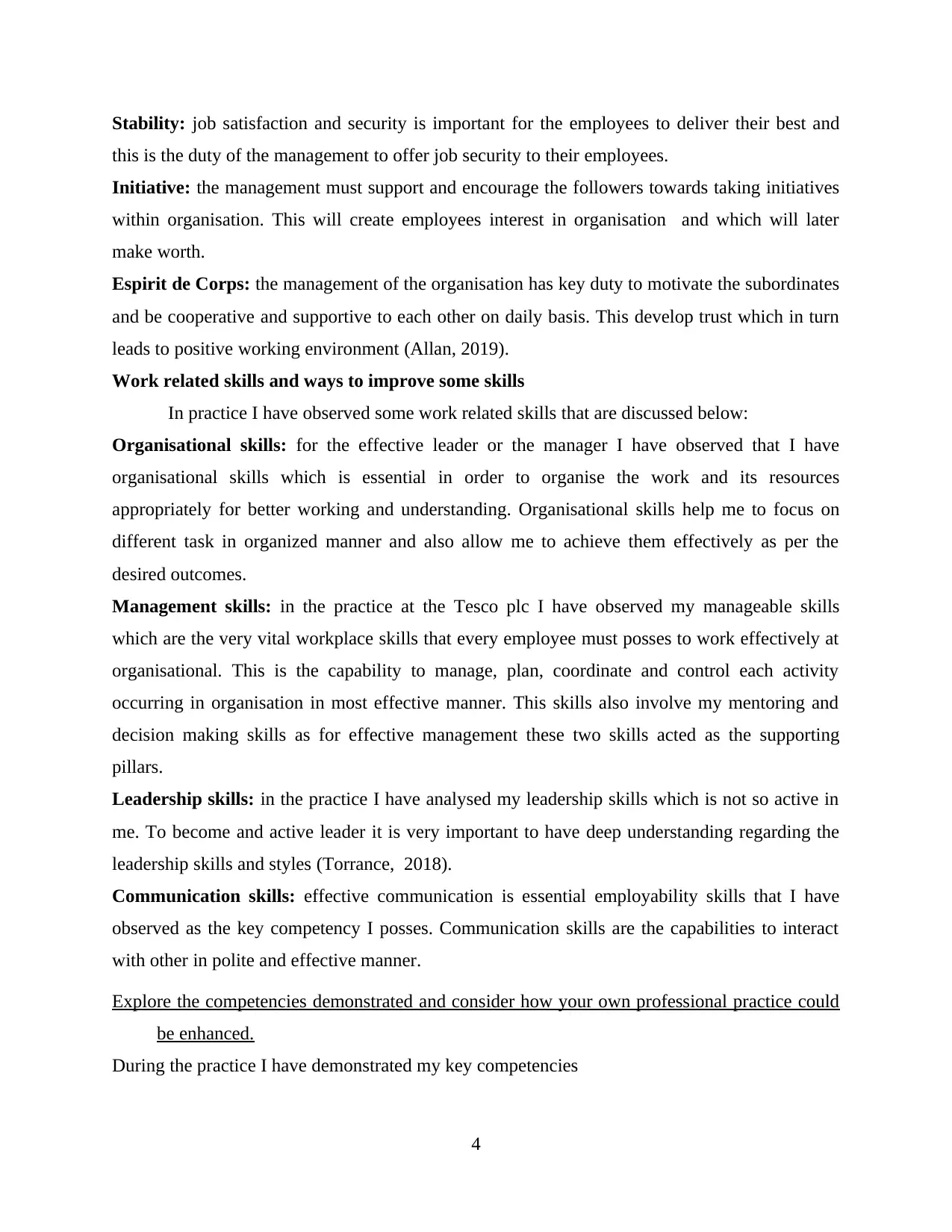
Stability: job satisfaction and security is important for the employees to deliver their best and
this is the duty of the management to offer job security to their employees.
Initiative: the management must support and encourage the followers towards taking initiatives
within organisation. This will create employees interest in organisation and which will later
make worth.
Espirit de Corps: the management of the organisation has key duty to motivate the subordinates
and be cooperative and supportive to each other on daily basis. This develop trust which in turn
leads to positive working environment (Allan, 2019).
Work related skills and ways to improve some skills
In practice I have observed some work related skills that are discussed below:
Organisational skills: for the effective leader or the manager I have observed that I have
organisational skills which is essential in order to organise the work and its resources
appropriately for better working and understanding. Organisational skills help me to focus on
different task in organized manner and also allow me to achieve them effectively as per the
desired outcomes.
Management skills: in the practice at the Tesco plc I have observed my manageable skills
which are the very vital workplace skills that every employee must posses to work effectively at
organisational. This is the capability to manage, plan, coordinate and control each activity
occurring in organisation in most effective manner. This skills also involve my mentoring and
decision making skills as for effective management these two skills acted as the supporting
pillars.
Leadership skills: in the practice I have analysed my leadership skills which is not so active in
me. To become and active leader it is very important to have deep understanding regarding the
leadership skills and styles (Torrance, 2018).
Communication skills: effective communication is essential employability skills that I have
observed as the key competency I posses. Communication skills are the capabilities to interact
with other in polite and effective manner.
Explore the competencies demonstrated and consider how your own professional practice could
be enhanced.
During the practice I have demonstrated my key competencies
4
this is the duty of the management to offer job security to their employees.
Initiative: the management must support and encourage the followers towards taking initiatives
within organisation. This will create employees interest in organisation and which will later
make worth.
Espirit de Corps: the management of the organisation has key duty to motivate the subordinates
and be cooperative and supportive to each other on daily basis. This develop trust which in turn
leads to positive working environment (Allan, 2019).
Work related skills and ways to improve some skills
In practice I have observed some work related skills that are discussed below:
Organisational skills: for the effective leader or the manager I have observed that I have
organisational skills which is essential in order to organise the work and its resources
appropriately for better working and understanding. Organisational skills help me to focus on
different task in organized manner and also allow me to achieve them effectively as per the
desired outcomes.
Management skills: in the practice at the Tesco plc I have observed my manageable skills
which are the very vital workplace skills that every employee must posses to work effectively at
organisational. This is the capability to manage, plan, coordinate and control each activity
occurring in organisation in most effective manner. This skills also involve my mentoring and
decision making skills as for effective management these two skills acted as the supporting
pillars.
Leadership skills: in the practice I have analysed my leadership skills which is not so active in
me. To become and active leader it is very important to have deep understanding regarding the
leadership skills and styles (Torrance, 2018).
Communication skills: effective communication is essential employability skills that I have
observed as the key competency I posses. Communication skills are the capabilities to interact
with other in polite and effective manner.
Explore the competencies demonstrated and consider how your own professional practice could
be enhanced.
During the practice I have demonstrated my key competencies
4
⊘ This is a preview!⊘
Do you want full access?
Subscribe today to unlock all pages.

Trusted by 1+ million students worldwide
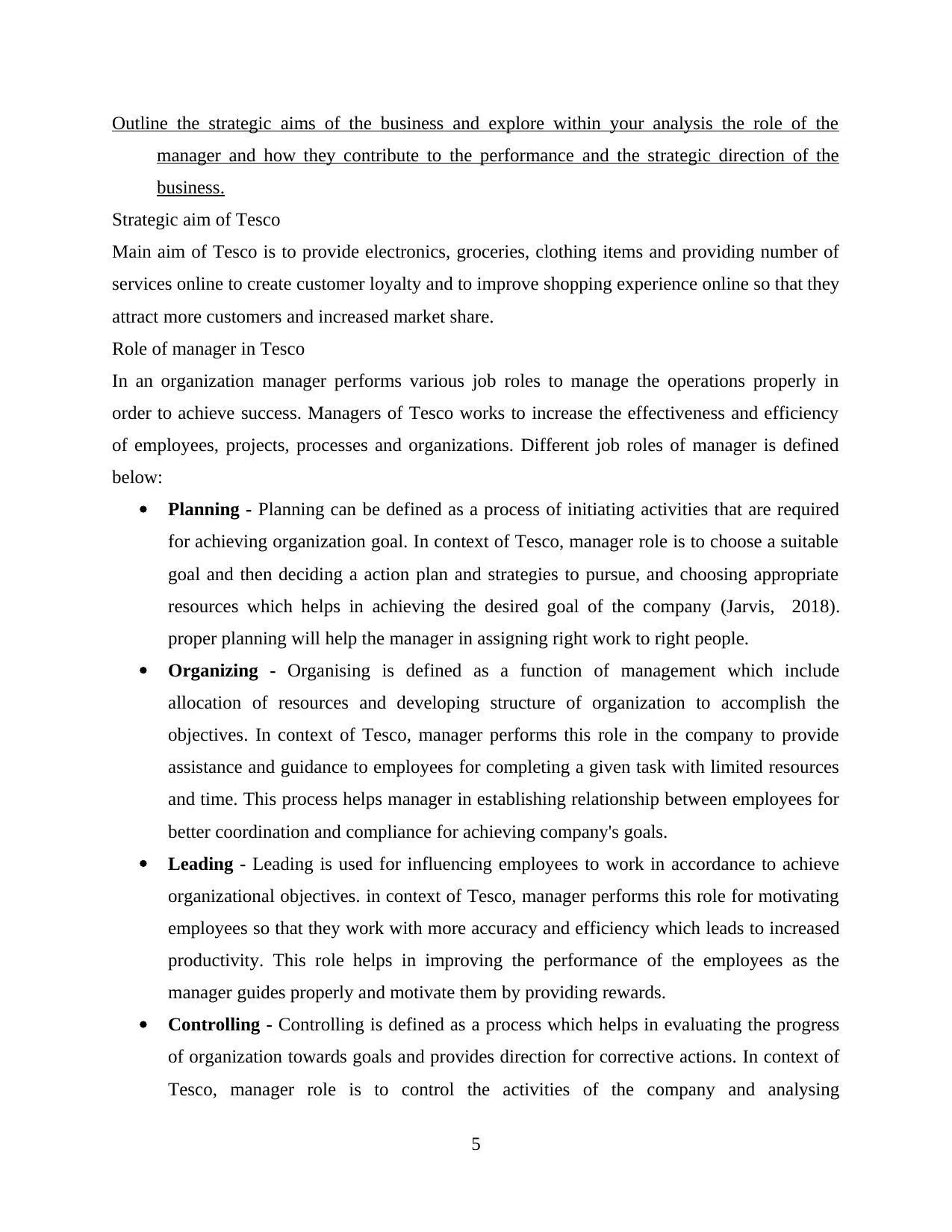
Outline the strategic aims of the business and explore within your analysis the role of the
manager and how they contribute to the performance and the strategic direction of the
business.
Strategic aim of Tesco
Main aim of Tesco is to provide electronics, groceries, clothing items and providing number of
services online to create customer loyalty and to improve shopping experience online so that they
attract more customers and increased market share.
Role of manager in Tesco
In an organization manager performs various job roles to manage the operations properly in
order to achieve success. Managers of Tesco works to increase the effectiveness and efficiency
of employees, projects, processes and organizations. Different job roles of manager is defined
below:
Planning - Planning can be defined as a process of initiating activities that are required
for achieving organization goal. In context of Tesco, manager role is to choose a suitable
goal and then deciding a action plan and strategies to pursue, and choosing appropriate
resources which helps in achieving the desired goal of the company (Jarvis, 2018).
proper planning will help the manager in assigning right work to right people.
Organizing - Organising is defined as a function of management which include
allocation of resources and developing structure of organization to accomplish the
objectives. In context of Tesco, manager performs this role in the company to provide
assistance and guidance to employees for completing a given task with limited resources
and time. This process helps manager in establishing relationship between employees for
better coordination and compliance for achieving company's goals.
Leading - Leading is used for influencing employees to work in accordance to achieve
organizational objectives. in context of Tesco, manager performs this role for motivating
employees so that they work with more accuracy and efficiency which leads to increased
productivity. This role helps in improving the performance of the employees as the
manager guides properly and motivate them by providing rewards.
Controlling - Controlling is defined as a process which helps in evaluating the progress
of organization towards goals and provides direction for corrective actions. In context of
Tesco, manager role is to control the activities of the company and analysing
5
manager and how they contribute to the performance and the strategic direction of the
business.
Strategic aim of Tesco
Main aim of Tesco is to provide electronics, groceries, clothing items and providing number of
services online to create customer loyalty and to improve shopping experience online so that they
attract more customers and increased market share.
Role of manager in Tesco
In an organization manager performs various job roles to manage the operations properly in
order to achieve success. Managers of Tesco works to increase the effectiveness and efficiency
of employees, projects, processes and organizations. Different job roles of manager is defined
below:
Planning - Planning can be defined as a process of initiating activities that are required
for achieving organization goal. In context of Tesco, manager role is to choose a suitable
goal and then deciding a action plan and strategies to pursue, and choosing appropriate
resources which helps in achieving the desired goal of the company (Jarvis, 2018).
proper planning will help the manager in assigning right work to right people.
Organizing - Organising is defined as a function of management which include
allocation of resources and developing structure of organization to accomplish the
objectives. In context of Tesco, manager performs this role in the company to provide
assistance and guidance to employees for completing a given task with limited resources
and time. This process helps manager in establishing relationship between employees for
better coordination and compliance for achieving company's goals.
Leading - Leading is used for influencing employees to work in accordance to achieve
organizational objectives. in context of Tesco, manager performs this role for motivating
employees so that they work with more accuracy and efficiency which leads to increased
productivity. This role helps in improving the performance of the employees as the
manager guides properly and motivate them by providing rewards.
Controlling - Controlling is defined as a process which helps in evaluating the progress
of organization towards goals and provides direction for corrective actions. In context of
Tesco, manager role is to control the activities of the company and analysing
5
Paraphrase This Document
Need a fresh take? Get an instant paraphrase of this document with our AI Paraphraser
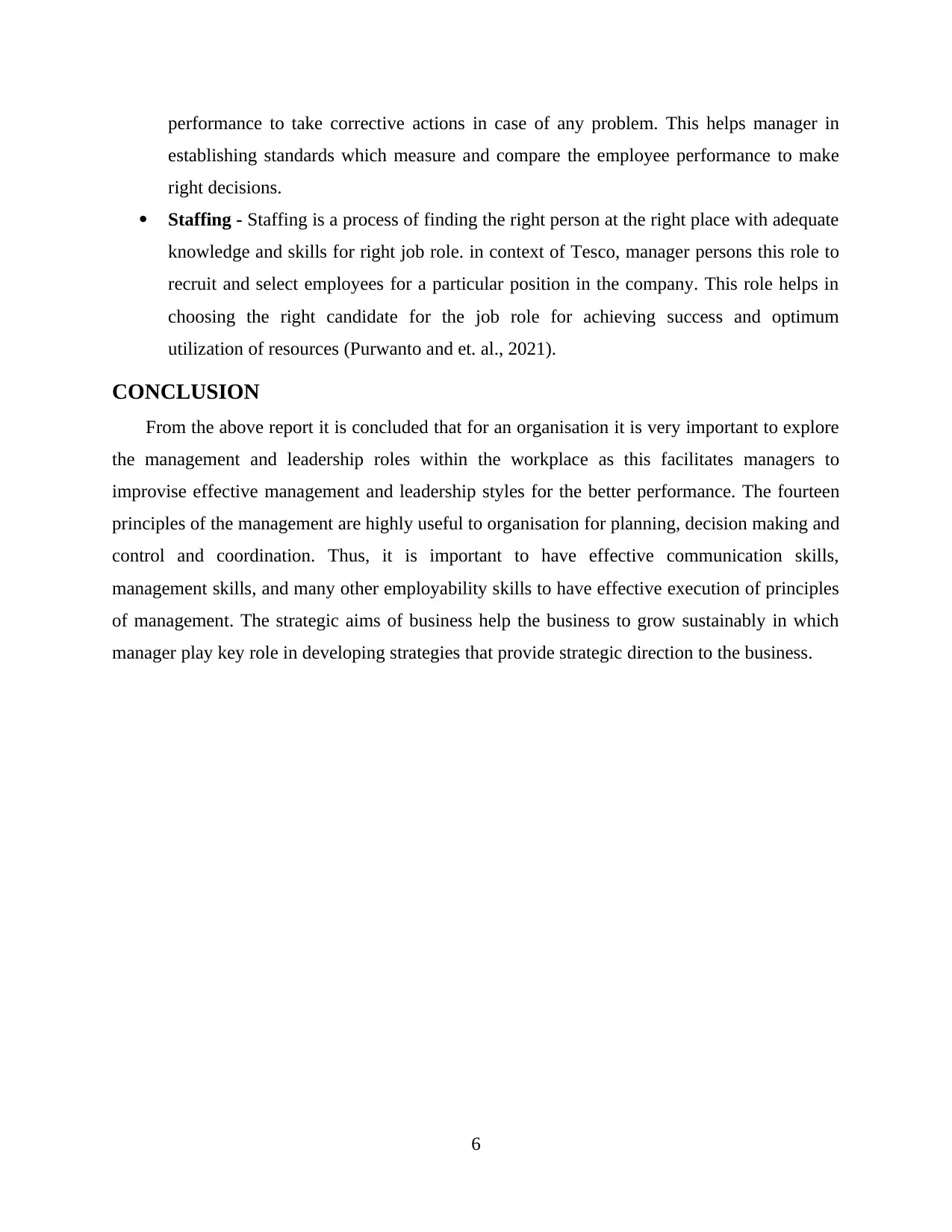
performance to take corrective actions in case of any problem. This helps manager in
establishing standards which measure and compare the employee performance to make
right decisions.
Staffing - Staffing is a process of finding the right person at the right place with adequate
knowledge and skills for right job role. in context of Tesco, manager persons this role to
recruit and select employees for a particular position in the company. This role helps in
choosing the right candidate for the job role for achieving success and optimum
utilization of resources (Purwanto and et. al., 2021).
CONCLUSION
From the above report it is concluded that for an organisation it is very important to explore
the management and leadership roles within the workplace as this facilitates managers to
improvise effective management and leadership styles for the better performance. The fourteen
principles of the management are highly useful to organisation for planning, decision making and
control and coordination. Thus, it is important to have effective communication skills,
management skills, and many other employability skills to have effective execution of principles
of management. The strategic aims of business help the business to grow sustainably in which
manager play key role in developing strategies that provide strategic direction to the business.
6
establishing standards which measure and compare the employee performance to make
right decisions.
Staffing - Staffing is a process of finding the right person at the right place with adequate
knowledge and skills for right job role. in context of Tesco, manager persons this role to
recruit and select employees for a particular position in the company. This role helps in
choosing the right candidate for the job role for achieving success and optimum
utilization of resources (Purwanto and et. al., 2021).
CONCLUSION
From the above report it is concluded that for an organisation it is very important to explore
the management and leadership roles within the workplace as this facilitates managers to
improvise effective management and leadership styles for the better performance. The fourteen
principles of the management are highly useful to organisation for planning, decision making and
control and coordination. Thus, it is important to have effective communication skills,
management skills, and many other employability skills to have effective execution of principles
of management. The strategic aims of business help the business to grow sustainably in which
manager play key role in developing strategies that provide strategic direction to the business.
6
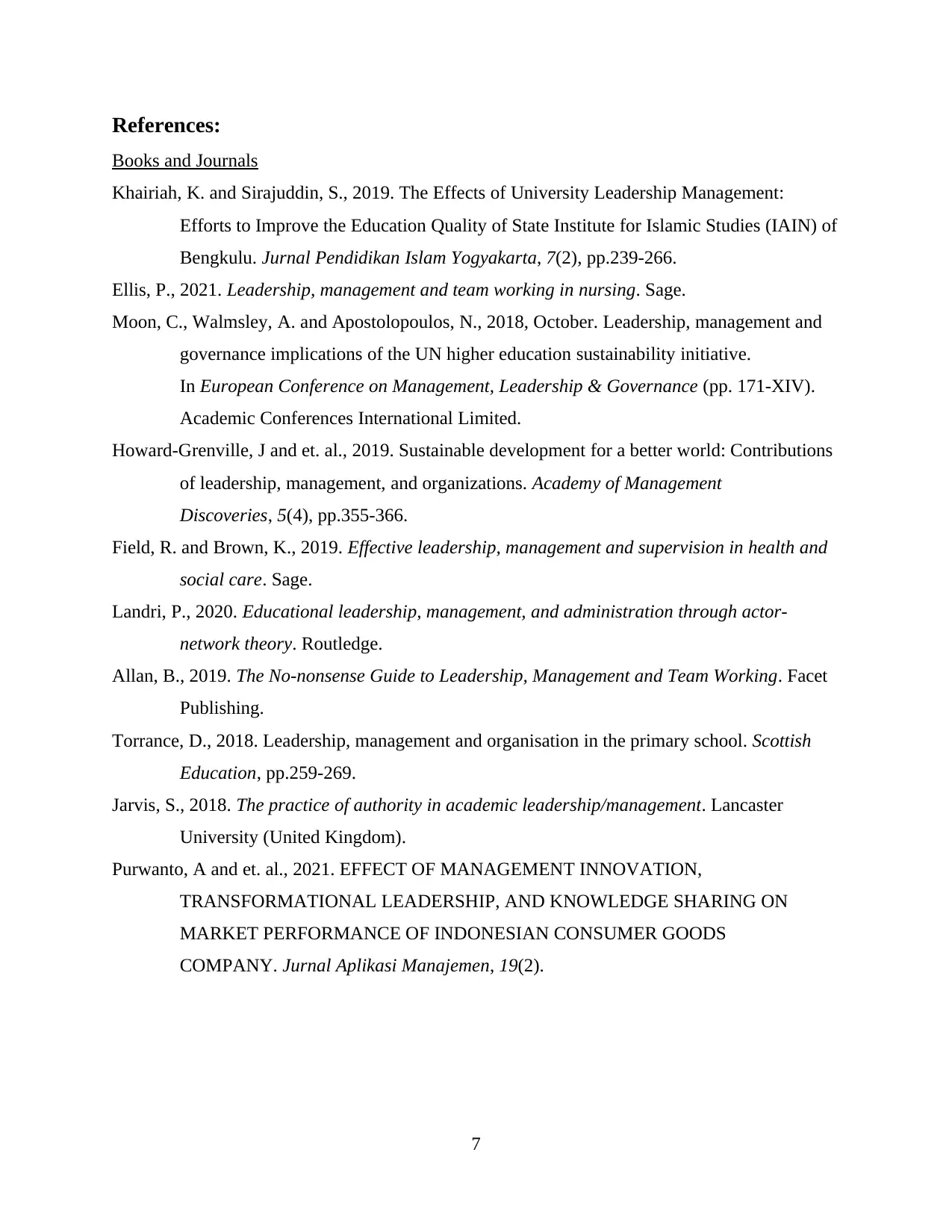
References:
Books and Journals
Khairiah, K. and Sirajuddin, S., 2019. The Effects of University Leadership Management:
Efforts to Improve the Education Quality of State Institute for Islamic Studies (IAIN) of
Bengkulu. Jurnal Pendidikan Islam Yogyakarta, 7(2), pp.239-266.
Ellis, P., 2021. Leadership, management and team working in nursing. Sage.
Moon, C., Walmsley, A. and Apostolopoulos, N., 2018, October. Leadership, management and
governance implications of the UN higher education sustainability initiative.
In European Conference on Management, Leadership & Governance (pp. 171-XIV).
Academic Conferences International Limited.
Howard-Grenville, J and et. al., 2019. Sustainable development for a better world: Contributions
of leadership, management, and organizations. Academy of Management
Discoveries, 5(4), pp.355-366.
Field, R. and Brown, K., 2019. Effective leadership, management and supervision in health and
social care. Sage.
Landri, P., 2020. Educational leadership, management, and administration through actor-
network theory. Routledge.
Allan, B., 2019. The No-nonsense Guide to Leadership, Management and Team Working. Facet
Publishing.
Torrance, D., 2018. Leadership, management and organisation in the primary school. Scottish
Education, pp.259-269.
Jarvis, S., 2018. The practice of authority in academic leadership/management. Lancaster
University (United Kingdom).
Purwanto, A and et. al., 2021. EFFECT OF MANAGEMENT INNOVATION,
TRANSFORMATIONAL LEADERSHIP, AND KNOWLEDGE SHARING ON
MARKET PERFORMANCE OF INDONESIAN CONSUMER GOODS
COMPANY. Jurnal Aplikasi Manajemen, 19(2).
7
Books and Journals
Khairiah, K. and Sirajuddin, S., 2019. The Effects of University Leadership Management:
Efforts to Improve the Education Quality of State Institute for Islamic Studies (IAIN) of
Bengkulu. Jurnal Pendidikan Islam Yogyakarta, 7(2), pp.239-266.
Ellis, P., 2021. Leadership, management and team working in nursing. Sage.
Moon, C., Walmsley, A. and Apostolopoulos, N., 2018, October. Leadership, management and
governance implications of the UN higher education sustainability initiative.
In European Conference on Management, Leadership & Governance (pp. 171-XIV).
Academic Conferences International Limited.
Howard-Grenville, J and et. al., 2019. Sustainable development for a better world: Contributions
of leadership, management, and organizations. Academy of Management
Discoveries, 5(4), pp.355-366.
Field, R. and Brown, K., 2019. Effective leadership, management and supervision in health and
social care. Sage.
Landri, P., 2020. Educational leadership, management, and administration through actor-
network theory. Routledge.
Allan, B., 2019. The No-nonsense Guide to Leadership, Management and Team Working. Facet
Publishing.
Torrance, D., 2018. Leadership, management and organisation in the primary school. Scottish
Education, pp.259-269.
Jarvis, S., 2018. The practice of authority in academic leadership/management. Lancaster
University (United Kingdom).
Purwanto, A and et. al., 2021. EFFECT OF MANAGEMENT INNOVATION,
TRANSFORMATIONAL LEADERSHIP, AND KNOWLEDGE SHARING ON
MARKET PERFORMANCE OF INDONESIAN CONSUMER GOODS
COMPANY. Jurnal Aplikasi Manajemen, 19(2).
7
⊘ This is a preview!⊘
Do you want full access?
Subscribe today to unlock all pages.

Trusted by 1+ million students worldwide
1 out of 9
Related Documents
Your All-in-One AI-Powered Toolkit for Academic Success.
+13062052269
info@desklib.com
Available 24*7 on WhatsApp / Email
![[object Object]](/_next/static/media/star-bottom.7253800d.svg)
Unlock your academic potential
Copyright © 2020–2026 A2Z Services. All Rights Reserved. Developed and managed by ZUCOL.




